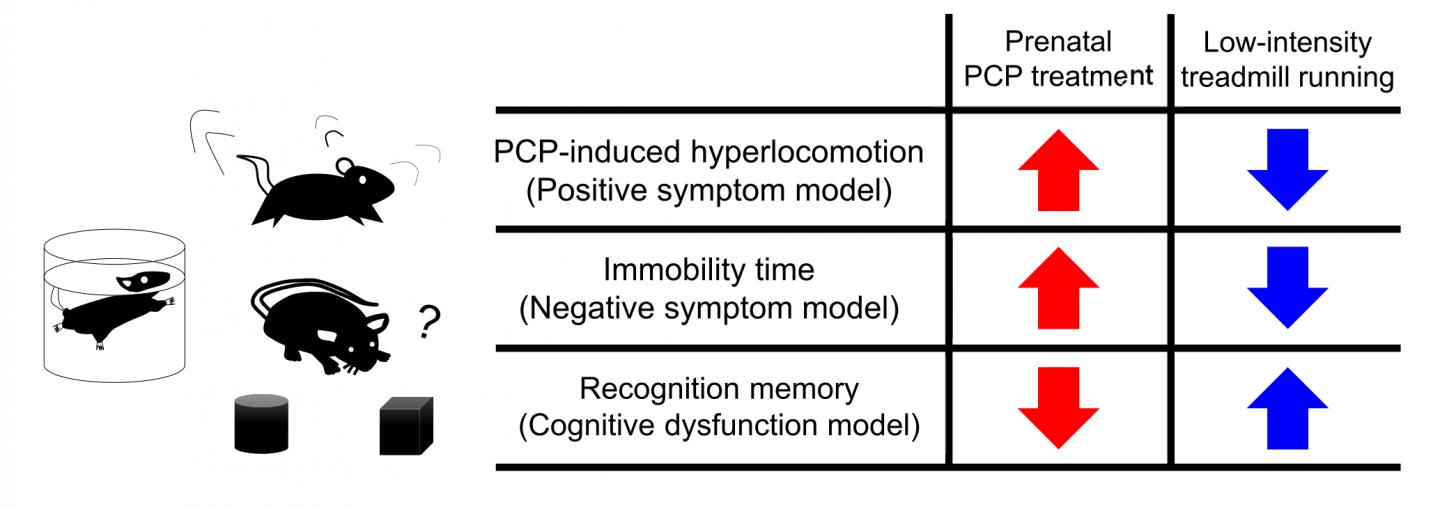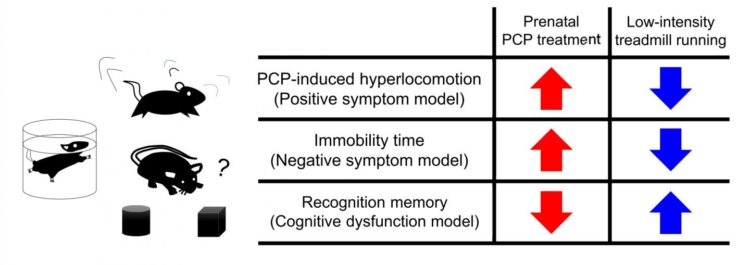Researchers from the University of Tsukuba have found that low-intensity exercise during adolescence has protective effects in a mouse model of schizophrenia

Credit: University of Tsukuba
Tsukuba, Japan – Although schizophrenia is increasingly understood as a neurodevelopmental disorder, environmental factors are known to play an important role in the disease onset and progression. But now, researchers from Japan have found that exercise during a specific postnatal period may prevent the development of behaviors associated with schizophrenia.
In a study published this month in Biochemical and Biophysical Research Communications, researchers from the University of Tsukuba have revealed that low-intensity exercise during adolescence, which is a critical developmental period, significantly reduced abnormal behaviors in a mouse model of schizophrenia.
An enriched environment during development has been found to have a number of positive effects on brain function, including the prevention of neurodevelopmental disorders. Although exercise appears to have a particularly important effect, the combination of variables present in enriched environments can make it difficult to isolate the mechanisms underlying the beneficial effects. To address this, the researchers at the University of Tsukuba developed a new exercise model in which mice ran on a treadmill at a fixed speed. They then tested whether low-intensity treadmill running prevented abnormal behaviors in a mouse model of schizophrenia.
“Previous studies have shown that exercise can enhance neuronal transmission and have other beneficial effects,” says lead author of the study Hikaru Koizumi. “However, the intensity, duration, and frequency of exercise have varied among studies using wheel running, making it difficult to determine how much exercise would be necessary to see these positive effects in humans.”
To address this, the researchers examined behavioral and neurological function in mice that had been exposed to phencyclidine (PCP) hydrochloride during perinatal development, which is a common model of schizophrenia. The mice were then exposed to 4 weeks of low-intensity exercise during adolescence, and tested to see whether they exhibited abnormal behaviors and associated neurological abnormalities.
“The results were surprising,” explains senior author Professor Hideaki Soya. “Our finding that low-intensity exercise could prevent abnormal behaviors indicates that exercise may directly contribute to the prevention of schizophrenia.”
This has important implications for the potential neuropathology of schizophrenia, especially given that the low-intensity exercise recovered changes in neural signaling associated with the expected behavioral abnormalities.
“Our findings indicate that mild exercise habits during development could have a powerful preventative effect in individuals who are genetically predisposed to schizophrenia. As such, exercise could be a particularly important consideration for individuals who are at risk for developing the condition,” says Professor Soya.
Mild exercise during development could prevent schizophrenia by masking or improving neurodevelopmental abnormalities present due to genetic inheritance. Specialized exercise programs for individuals who are at risk may be successful in preventing the development of schizophrenia, with serious implications for the quality of life in these individuals.
###
The article, “Preventive role of regular low-intensity exercise during adolescence in schizophrenia model mice with abnormal behaviors” was published in Biochemical and Biophysical Research Communications at DOI: https:/
Media Contact
Naoko Yamashina
[email protected]
Related Journal Article
http://dx.





